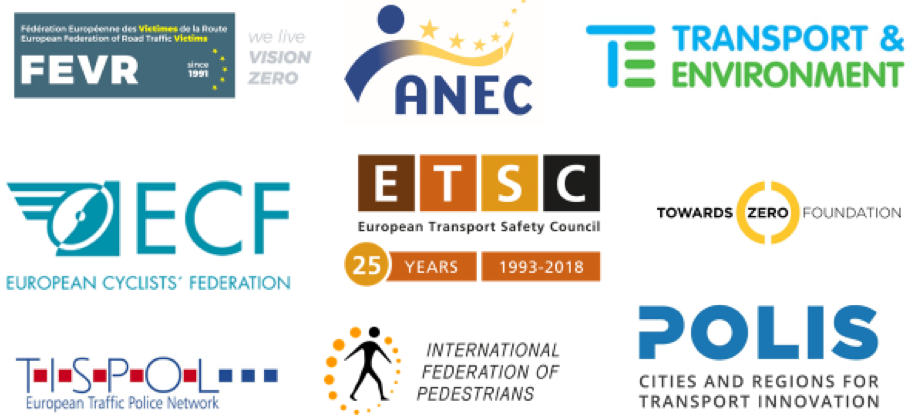|
Τι είναι η Ε.Υ.ΘΥ.Τ.Α.
Η ΕΥΘΥΤΑ ΡΟΔΟΥ- ΠΑΡΑΤΗΡΗΤΗΡΙΟ ΟΔΙΚΗΣ ΑΣΦΑΛΕΙΑΣ
Εταιρεία Υποστήριξης Θυμάτων Τροχαίων Ατυχημάτων είναι ένας Μη Κερδοσκοπικός, Μη Κυβερνητικός Οργανισμός, στο χώρο της Οδικής Ασφάλειας.
Στη Ρόδο λειτουργεί από τον Ιούνιο 2004 , πρωτοβουλία της Προέδρου Καρύδη Ελένης, θύμα τροχαίου ατυχήματος, μετά από τον χαμό του γιου της Δημήτρη 19 χρόνων στις 12 Φεβρουαρίου 2002, πλαισιωμένη από επιστήμονες, θύματα, συγγενείς τροχαίων δυστυχημάτων και ευαισθητοποιημένα άτομα στο θέμα της Οδικής Ασφάλειας.
Είναι μέλος:
-Της Ευρωπαϊκής Ομοσπονδίας Θυμάτων Τροχαίων Ατυχημάτων-FEVR (Σύμβουλος του Ο.Η.Ε και του Π.Ο.Υ)
-Υποστηρικτής της Παγκόσμιας Οργάνωσης « MAKE ROADS SAFE »
-Το 2008 υπέγραψε την Ευρωπαϊκή Χάρτα Οδικής Ασφάλειας, για λιγότερα θύματα με την υποστήριξη της Ε.Ε.
-Αρωγό μέλος του Ε.Δ.Ι.ΠΑ.Β (Εθνικό Δίκτυο Πρόληψης Ατυχημάτων , συμπεριλαμβανομένων των τροχαίων)
-Μέλος της Διακομματικής Επιτροπής Δήμου Ρόδου
-Υποστηρικτής της Παγκόσμιας Οργάνωσης « MAKE ROADS SAFE »
-Το 2008 υπέγραψε την Ευρωπαϊκή Χάρτα Οδικής Ασφάλειας, για λιγότερα θύματα με την υποστήριξη της Ε.Ε.
-Αρωγό μέλος του Ε.Δ.Ι.ΠΑ.Β (Εθνικό Δίκτυο Πρόληψης Ατυχημάτων , συμπεριλαμβανομένων των τροχαίων)
-Μέλος της Διακομματικής Επιτροπής Δήμου Ρόδου
-Ιδρυτικό μέλος του Πανελλαδικού Συλλόγου
"SOS ΤΡΟΧΑΙΑ ΕΓΚΛΗΜΑΤΑ"
-Υποστηρίζει την Δεκαετία Δράσης 2011-2020 για την Οδική Ασφάλεια
-Συνεργάζεται με φορείς του Δημόσιου του Ιδιωτικού τομέα, με Παγκόσμιους & Ευρωπαϊκούς Φορείς και Οργανισμούς.
Ποιοι είναι οι σκοποί :
+Η υποστήριξη των θυμάτων των Τροχαίων Ατυχημάτων από ομάδα συμβούλων ( νομικών, ιατρών, ειδικών εμπειρογνωμόνων, συγκοινωνιολόγων, μηχανολόγων, εκπαιδευτικών, ψυχολόγων, κοινωνικών λειτουργών ).
-Υποστηρίζει την Δεκαετία Δράσης 2011-2020 για την Οδική Ασφάλεια
-Συνεργάζεται με φορείς του Δημόσιου του Ιδιωτικού τομέα, με Παγκόσμιους & Ευρωπαϊκούς Φορείς και Οργανισμούς.
Ποιοι είναι οι σκοποί :
+Η υποστήριξη των θυμάτων των Τροχαίων Ατυχημάτων από ομάδα συμβούλων ( νομικών, ιατρών, ειδικών εμπειρογνωμόνων, συγκοινωνιολόγων, μηχανολόγων, εκπαιδευτικών, ψυχολόγων, κοινωνικών λειτουργών ).
+Η ανάπτυξη αλληλεγγύης μεταξύ των θυμάτων των Τροχαίων Ατυχημάτων( ηθική υποστήριξη ).
+Η οργανωμένη παρέμβαση και η κοινωνική πίεση προς τους φορείς της πολιτείας, για τη βελτίωση της οδικής ασφάλειας και την μείωση των τροχαίων ατυχημάτων.
+Η υποστήριξη η ανάληψη και προώθηση δραστηριοτήτων σε θέματα τα οποία προάγουν την οδική ασφάλεια, την κυκλοφοριακή αγωγή, την έρευνα, την ενημέρωση , την ευαισθητοποίηση των πολιτών των ιδιαίτερα ευάλωτων ηλικιών (μαθητών, ηλικιωμένων).
Ποιο είναι το Δυναμικό της:
+Η οργανωμένη παρέμβαση και η κοινωνική πίεση προς τους φορείς της πολιτείας, για τη βελτίωση της οδικής ασφάλειας και την μείωση των τροχαίων ατυχημάτων.
+Η υποστήριξη η ανάληψη και προώθηση δραστηριοτήτων σε θέματα τα οποία προάγουν την οδική ασφάλεια, την κυκλοφοριακή αγωγή, την έρευνα, την ενημέρωση , την ευαισθητοποίηση των πολιτών των ιδιαίτερα ευάλωτων ηλικιών (μαθητών, ηλικιωμένων).
Ποιο είναι το Δυναμικό της:
Η ΕΥΘΥΤΑ ΡΟΔΟΥ, διαθέτει ένα τεχνοκρατικό πυρήνα από επιστήμονες- μέλη διαφόρων κλάδων ( Υγειονομικούς, Νομικούς, Εκπαιδευτικούς, Μηχανολόγους- Μηχανικούς, Πραγματογνώμονες, Συγκοινωνιολόγους, Οικονομολόγους, Αναλυτές Η/Υ, Ψυχολόγους, Κοινωνικούς Λειτουργούς).
Το δυναμικό της ΕΥΘΥΤΑ ΡΟΔΟΥ, ανταποκρίνεται απόλυτα στις υψηλές απαιτήσεις σοβαρών ερευνητικών προγραμμάτων, με θέμα την Οδική Ασφάλεια, την πρόσληψη και την μείωση των Τροχαίων Ατυχημάτων.
Διαθέτει επίσης ένα αξιόλογο επιτελείο έμπειρων επιστημόνων, που της επέτρεψε ως τώρα να πραγματοποιήσει πολλαπλές εκπαιδευτικές- ενημερωτικές δράσεις με στόχο τη βελτίωση της Οδικής Συμπεριφοράς.
Ποιες είναι οι Δραστηριότητές της:
Η ΕΥΘΥΤΑ ΡΟΔΟΥ, συμβάλλει δραστικά στην ενημέρωση των πολιτών για την Οδική Ασφάλεια, την πρόληψη και την μείωση των τροχαίων ατυχημάτων και παρέχει σε μόνιμη βάση Νομική, Ιατρική, Ψυχολογική και Κοινωνική Υποστήριξη σε θύματα και συγγενείς θυμάτων Τροχαίων Ατυχημάτων όταν αυτή ζητηθεί.
Η ΕΥΘΥΤΑ ΡΟΔΟΥ, έχει διοργανώσει εκδηλώσεις ( Ημερίδες, Έκθεση φωτογραφίας , Δράσεις σε ανοικτούς χώρους, Διδασκαλία σε Σχολεία Α/ας και Β/ας Εκπαίδευσης, Σεμινάρια σε κέντρα εκπαίδευσης νεοσυλλέκτων, Ενημερωτικές ομιλίες σε Δήμους της Ρόδου) στο πλαίσιο της ενημέρωσης των πολιτών σε θέματα που προάγουν την Οδική Ασφάλεια και έχει κάνει ουσιαστικές παρεμβάσεις στους φορείς σε θέματα Οδικής Ασφάλειας.
Έχει εκδώσει ενημερωτικά έντυπα με έγκυρη επιστημονική πληροφόρηση σε θέματα Οδικής Ασφάλειας.
Η ΕΥΘΥΤΑ ΡΟΔΟΥ, πιστεύει ότι για την επίτευξη αποτελεσμάτων χρειάζεται δραστηριοποίηση από τους πολίτες, υποστήριξη από τον κρατικό μηχανισμό και αλλαγή της αρνητικής νοοτροπίας στοιχεία που θα μας βοηθήσουν να απαλλαγούμε από την ιδιότητα της Ευρωπαϊκής χώρας με μεγάλο αριθμό Θυμάτων Τροχαίων δυστυχημάτων και με επικίνδυνους δρόμους για ασφαλή οδήγηση.
Το δυναμικό της ΕΥΘΥΤΑ ΡΟΔΟΥ, ανταποκρίνεται απόλυτα στις υψηλές απαιτήσεις σοβαρών ερευνητικών προγραμμάτων, με θέμα την Οδική Ασφάλεια, την πρόσληψη και την μείωση των Τροχαίων Ατυχημάτων.
Διαθέτει επίσης ένα αξιόλογο επιτελείο έμπειρων επιστημόνων, που της επέτρεψε ως τώρα να πραγματοποιήσει πολλαπλές εκπαιδευτικές- ενημερωτικές δράσεις με στόχο τη βελτίωση της Οδικής Συμπεριφοράς.
Ποιες είναι οι Δραστηριότητές της:
Η ΕΥΘΥΤΑ ΡΟΔΟΥ, συμβάλλει δραστικά στην ενημέρωση των πολιτών για την Οδική Ασφάλεια, την πρόληψη και την μείωση των τροχαίων ατυχημάτων και παρέχει σε μόνιμη βάση Νομική, Ιατρική, Ψυχολογική και Κοινωνική Υποστήριξη σε θύματα και συγγενείς θυμάτων Τροχαίων Ατυχημάτων όταν αυτή ζητηθεί.
Η ΕΥΘΥΤΑ ΡΟΔΟΥ, έχει διοργανώσει εκδηλώσεις ( Ημερίδες, Έκθεση φωτογραφίας , Δράσεις σε ανοικτούς χώρους, Διδασκαλία σε Σχολεία Α/ας και Β/ας Εκπαίδευσης, Σεμινάρια σε κέντρα εκπαίδευσης νεοσυλλέκτων, Ενημερωτικές ομιλίες σε Δήμους της Ρόδου) στο πλαίσιο της ενημέρωσης των πολιτών σε θέματα που προάγουν την Οδική Ασφάλεια και έχει κάνει ουσιαστικές παρεμβάσεις στους φορείς σε θέματα Οδικής Ασφάλειας.
Έχει εκδώσει ενημερωτικά έντυπα με έγκυρη επιστημονική πληροφόρηση σε θέματα Οδικής Ασφάλειας.
Η ΕΥΘΥΤΑ ΡΟΔΟΥ, πιστεύει ότι για την επίτευξη αποτελεσμάτων χρειάζεται δραστηριοποίηση από τους πολίτες, υποστήριξη από τον κρατικό μηχανισμό και αλλαγή της αρνητικής νοοτροπίας στοιχεία που θα μας βοηθήσουν να απαλλαγούμε από την ιδιότητα της Ευρωπαϊκής χώρας με μεγάλο αριθμό Θυμάτων Τροχαίων δυστυχημάτων και με επικίνδυνους δρόμους για ασφαλή οδήγηση.
http://www.efhtita.gr
23 Οκτ 2018
Press Release Car industry attempting to weaken the European Commission’s proposals on new vehicle safety measures
Εγγραφή σε:
Σχόλια ανάρτησης (Atom)




Δεν υπάρχουν σχόλια:
Δημοσίευση σχολίου